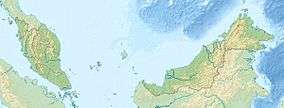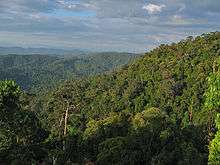Taman Negara
| Taman Negara | |
|---|---|
|
IUCN category II (national park) | |
|
View of Sungai Tembeling from atop the Canopy Walkway | |
 | |
| Location | Malaysia |
| Nearest city | Kuala Tembeling |
| Coordinates | 4°42′N 102°28′E / 4.700°N 102.467°ECoordinates: 4°42′N 102°28′E / 4.700°N 102.467°E |
| Area | 4,343 km2 |
| Established | 1938/1939 |
| Governing body | Department of Wildlife and National Parks |

Taman Negara was established at the Titiwangsa Mountains, Malaysia, in 1938/1939 as the King George V National Park. It was renamed to Taman Negara after independence, which means "national park" in Malay. Taman Negara has a total area of 4,343 km2 and has a reputation as the world's oldest deciduous rainforest, estimated to be more than 130 million years old.[1][2] Despite the reputation, the title of "oldest tropical rainforest" more accurately belongs to the Daintree Rainforest in Queensland, Australia, estimated to be between 135 million years old [3] and 180 million years old.[4]
Taman Negara encompasses three states, Pahang, Kelantan and Terengganu, each with its own legislation. The Taman Negara Enactment (Pahang) No. 2 of 1939 is enforced in the state of Pahang, the Taman Negara Enactment (Kelantan) No. 14 of 1938 in the state of Kelantan and the Taman Negara Enactment (Terengganu) No. 6 of 1939 in the state of Terengganu. The enactments have similar contents.
Taman Negara Pahang is the largest at 2,477 km2, followed by Taman Negara Kelantan at 1,043 km2 and Taman Negara Terengganu at 853 km2.
The park has been developed into a famous ecotourism destination in Malaysia. There are several geological and biological attractions in the park. Gunung Tahan is the highest point of the Malay Peninsula; climbers can use Kuala Tahan or Merapoh[5] as their departure point. Taman Negara is the home of some rare mammals, such as the Malayan tiger, crab-eating macaque, Malayan gaur (seladang) and Indian elephant. As well as birds such as the great argus, red junglefowl, and the rare Malayan peacock-pheasant are still found here in some numbers. Tahan River has been preserved to protect the Malaysian mahseer (ikan kelah in Malay), a type of game fish.
Others attractions found near Kuala Tahan (Park headquarters for Pahang) include a canopy walkway, Gua Telinga (cave system), Lata Berkoh (rapid). Visitors can enjoy the tropical rainforest, birdwatching or jungle trekking (e.g. Tenor Rentis) and the river views along the Tahan River.
All visitors to the park must get permits from the Department of Wildlife and National Parks.
Transportation
Keretapi Tanah Melayu (KTM)'s KTM Intercity and Express trains stop at Jerantut railway station. Visitors to Taman Negara can disembark here.
Local tour operators arrange transportation from Kuala Lumpur to the entrance of the Park at Kuala Tahan. This will involve a 3-hour bus journey followed by a 2.5 hour river boat ride to Kuala Tahan. Entrance permits and park tours are often included in the package.
By bus
Kuala Lumpur
From Kuala Lumpur, buses to Taman Negara National Park leave from Bangunan Mariamman, Jalan Hang Kasturi-nearby Pasar Seni Transportation Hub.(GoKLCityBus).Daily departure at 8.30am including public holiday. 3hrs traveling time from Kuala Lumpur to Kuala Tembeling Jetty and after that another 3hrs boat ride upstream to Kuala Tahan.
See also
- List of national parks of Malaysia
- Gunung Tahan highest point in peninsula Malaysia.
References
- ↑ http://www.highonadventure.com/Hoa02aug/Malaysia/malaysia.htm
- ↑ http://travelmalaysiaguide.com/taman-negara/
- ↑ https://www.transfercarus.com/blog/travel-tips-us/jungle-surfing-in-the-oldest-rainforest-in-the-world
- ↑ http://www.theaustralian.com.au/life/weekend-australian-magazine/the-oldest-rainforest/story-e6frg8h6-1226117628781
- ↑ http://www.junglediary.com/taman-negara-and-sungai-yu-forest-reserve/
External links
| Wikimedia Commons has media related to Taman Negara National Park. |
-
 Taman Negara travel guide from Wikivoyage
Taman Negara travel guide from Wikivoyage - Tourism Malaysia - Taman Negara
- Department of Wildlife and National Parks
- Jerantut KTM Railway Station